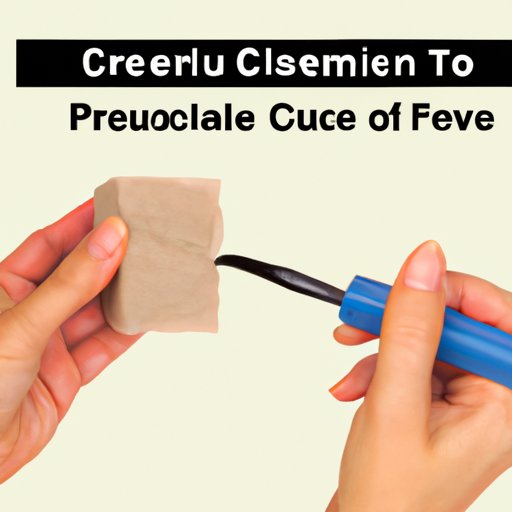
I. Introduction
Anal fissure is a painful condition that affects many people in their lifetime. It is a small tear or split in the skin lining the anal canal, causing discomfort, itching, and bleeding. The symptoms can be distressing and affect one’s quality of life. The purpose of this article is to provide a comprehensive guide on how to cure fissure permanently. By adopting these remedies and lifestyle changes, readers can experience long-term relief and healing.
II. Diet Modifications
A healthy diet is critical in relieving anal fissure. Eating high-fiber foods such as fruits, vegetables, and whole grains can ease constipation and soften stool. Adding beans, nuts, and seeds to the diet can also help. Drinking plenty of water and fluids can improve digestion and bowel movements, thereby reducing the risk of constipation. Limiting foods that can aggravate fissures such as caffeine, alcohol, and spicy foods can also help reduce pain and inflammation.
III. Warm Compress
A warm compress is an effective way to relax muscles and provide relief from pain. It can also improve blood flow and promote healing. To create a warm compress, soak a clean washcloth in warm water and wring out the excess water. Then, gently apply the compress to the affected area for 10-15 minutes. Repeat this remedy multiple times a day to experience relief from pain and discomfort.
IV. Sitz Bath
A sitz bath is a shallow bath that covers the hips and buttocks. It can provide relief from itching, pain, and inflammation caused by fissures. To take a sitz bath, fill a bathtub with warm water and add Epsom salt. Soak for 15-20 minutes, making sure the water covers the hips and buttocks. Repeat this remedy multiple times a day, especially after bowel movements, to promote healing and reduce discomfort.
V. Topical Ointments
There are several types of topical ointments available for treating anal fissures, including rectal suppositories, creams, and ointments. They help relieve pain, reduce inflammation, and promote healing. Some common types of ointments include hydrocortisone, lidocaine, and nitroglycerin. Hydrocortisone helps reduce inflammation, lidocaine works as a numbing agent, and nitroglycerin relaxes the anal sphincter and increases blood flow. It is essential to consult a doctor before using any topical ointments and choose the right one according to the type of fissure.
VI. Pelvic Floor Exercises
Pelvic floor exercises are an effective way to strengthen the muscles and speed up the healing process. These exercises can improve the blood flow and reduce the strain on the anus, thereby relieving the symptoms of anal fissure. To perform pelvic floor exercises, sit comfortably and squeeze the muscles around the anus as if you are trying to hold back gas. Hold for 5-10 seconds and relax. Repeat this exercise 10-20 times, three times a day.
VII. Surgery
In some cases, surgery may be necessary to treat anal fissure. Surgery is typically recommended when the condition persists for more than eight weeks or doesn’t respond to other treatments. There are two types of surgery available for treating fissures, including lateral internal sphincterotomy (LIS) and anal advancement flap. LIS involves cutting the anal sphincter muscles to provide relief, while anal advancement flap involves creating a flap of tissue around the fissure to promote healing. However, surgery is generally considered a last resort as it may cause complications and risks.
VIII. Natural Remedies
Natural remedies such as aloe vera, coconut oil, and essential oils can provide relief from anal fissure. Aloe vera has anti-inflammatory and soothing properties and can speed up the healing process. Coconut oil has antibacterial and antifungal properties and can help reduce pain and inflammation. Essential oils such as tea tree oil and lavender oil can be diluted and applied topically to the affected area to reduce pain and promote healing. However, it is essential to use these remedies with caution and consult a doctor before use.
IX. Conclusion
In conclusion, anal fissure is a painful condition that can be cured permanently with the right remedies and lifestyle changes. Diet modifications, warm compress, sitz bath, topical ointments, pelvic floor exercises, surgery, and natural remedies can all help reduce pain, inflammation, promote healing, and prevent recurrence. It is essential to try a combination of remedies and seek professional medical advice if necessary. A healthy diet, regular exercise, and maintaining proper hygiene can also help prevent fissures from occurring in the first place.





